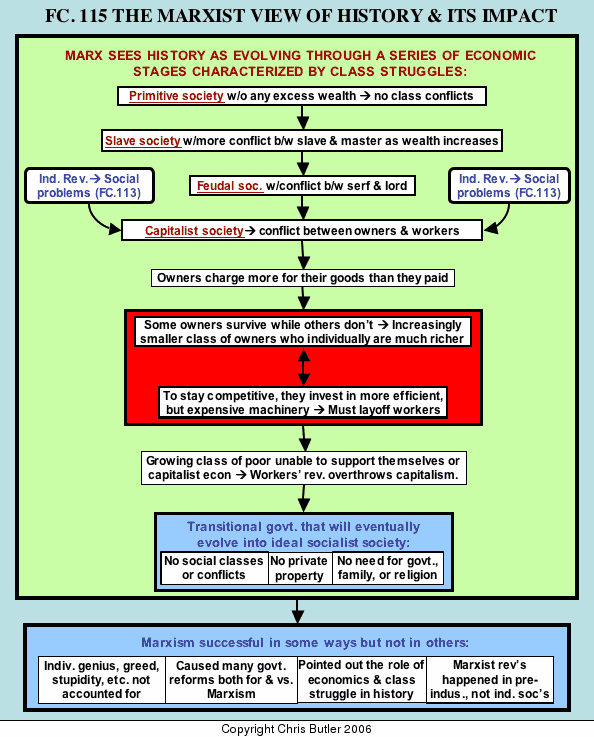FC115Socialism and the Marxist View of History
Religion is the opiate of the masses.— Karl Marx
One of the most powerful and influential philosophies of the nineteenth and twentieth centuries has been socialism, a doctrine believing the means of production should belong to the workers. This contrasts sharply with capitalism which has a small but very rich class of capitalists owning the means of production and an underclass of workers with little or no say in company policies. Socialism was a response to the horrible working and living conditions of the early industrial revolution. It was highly idealistic, drawing inspiration from a tradition of early Christian communal societies. In fact, it was often too idealistic and democratic, which doomed many early socialist communal experiments, such as one in New Harmony, Indiana, to failure.
Much more radical was Marxism, named after its founder, Karl Marx, who published The Communist Manifesto in 1848. While early socialists tried to build a new order within the existing one, Marx believed the present order must first be destroyed by revolution before a truly socialist society could evolve. However, Marxism is more than just a revolutionary call to arms for the working class. It is an entire system of thought with its own all encompassing view of society, economics, and history.
To start with, Marx believed in economic determinism, the idea that how a society produces and distributes its wealth will determine its social and political structure, laws, and even religion. Therefore, he saw history as a series of class struggles as humanity evolved through five basic stages of society:
-
Primitive hunting and gathering societies which had no extra wealth and therefore no private property, social classes, class struggles, or even the need for government;
-
Slave societies with a rich ruling class opposed by an oppressed underclass of slaves;
-
Feudal society with a noble class of landowning lords opposed by an oppressed class of serfs;
-
Capitalist society with a rich class of factory owners (bourgeoisie) opposed by an oppressed class of factory workers (the proletariat); and finally
-
Socialist society run by the workers with no private property, and thus no social classes, or class conflicts.
Marx saw each type of society as a necessary stage in the evolution toward the socialist society. Likewise, he saw the capitalist society of his own time as self destructive and moving inevitably toward socialist revolution. This largely hinged on his labor theory of value. This stated that any product was only worth as much the workers were paid to make it. Anything a capitalist charged beyond this amount was called surplus value. And it was here that Marx saw the beginning of the fatal cycle that would destroy capitalism.
If capitalists charged more for a product than their workers were paid to make it, not everyone could sell their goods because, among other things, the workers would not be paid enough to buy them. This would drive some owners out of business and create a smaller business class, although individually they each would be richer. However, to stay competitive, they would have to invest in more efficient, and expensive, machinery, thus laying off workers in the process. Since they would still overcharge for their products and there were now even fewer workers to buy them, more owners would be driven from business and the cycle would repeat.
However, this cycle could not continue indefinitely, since each time around there would be a growing gap between the fabulously rich and desperately poor. Eventually, this would trigger a revolution that would destroy the capitalist order. The triumphant workers would then build a society where people as a whole owned everything in common. Private property would disappear, and with it social classes, conflict over property, and any need for government, family, and religion, which were all seen as instruments of bourgeois oppression. There would be no rich or poor, thus allowing each individual to find true fulfillment. However, for all of this to happen, an intermediate stage of government would be necessary to guide the revolution to this workers' utopia.
Marxism had both its good points and its problems. First of all, it was valuable for pointing out the importance of economics and class struggle in history. On the other hand, it failed to account for the role of individual genius, stupidity, and especially greed in human affairs, assuming that everyone would voluntarily give up all individual possessions for the common good. Also, Marx assumed his socialist revolution would take place in industrialized countries, when in fact it actually occurred in pre-industrial societies such as Russia, China, and Cuba. This was largely because, by Marx's death in 1883, conditions for industrial workers were starting to improve, thus undercutting any appeal socialist revolution might have for them. However, many subsequent social reforms, both in countries that hated and feared Marxism as well as ones that followed it, could trace their existence back to Karl Marx.
